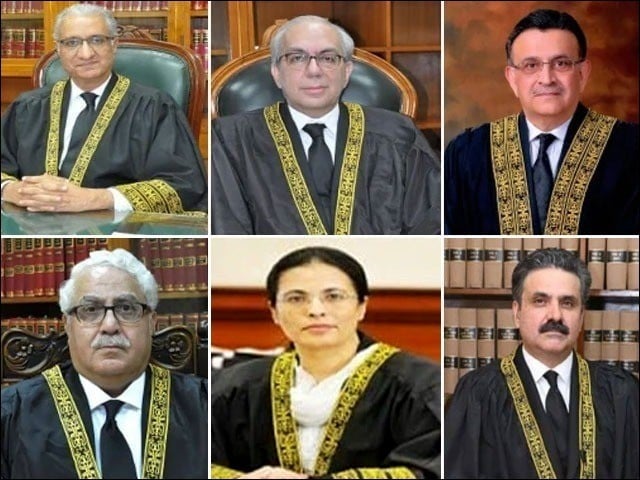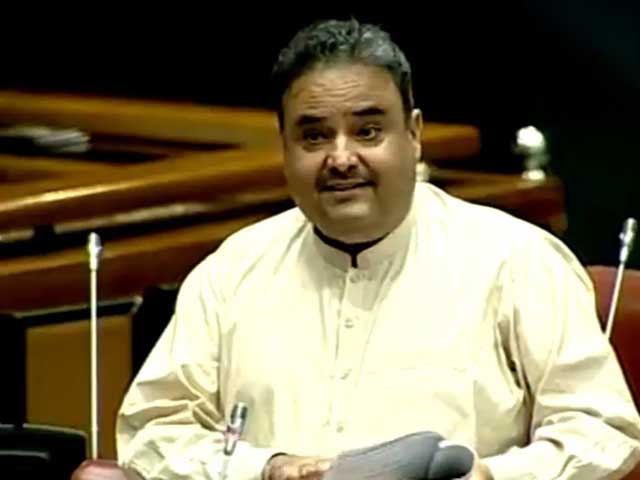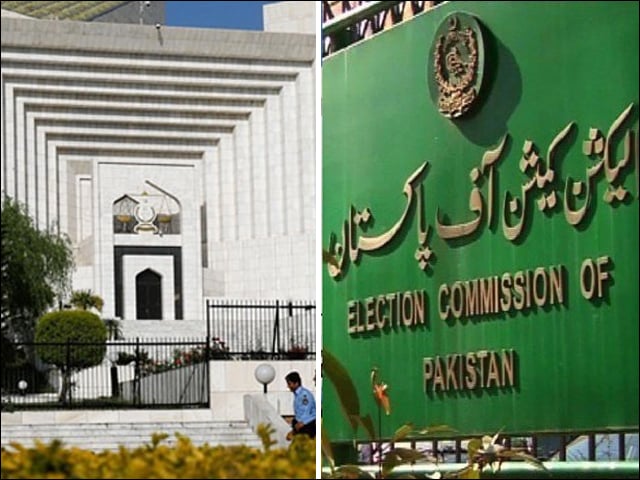Islamabad: In the case against the trial of civilians in military courts, the Attorney General assured the Supreme Court that detailed reasons would be mentioned in the trial decisions of the military courts on the May 9 incidents, while seeking a month’s respite to legislate on the issue of giving the right of appeal to 102 detainees.
The Supreme Court heard a case against the trial of civilians in military courts. A six-member larger bench headed by Chief Justice Umar Atta Bandial heard the case. The larger bench includes Justice Ijazul Ahsan, Justice Muneeb Akhtar, Justice Yahya Afridi, Justice Mazahir Ali Akbar Naqvi and Justice Ayesha Malik.
When the hearing on the petitions against the military courts began, Attorney General Mansoor Usman came to the rostrum.
The Attorney General argued that the Supreme Court had instructed me and I had talked about the organized plan behind May 9, I had also presented the photographs in the court and we are very careful about who should be tried in the military court.
The Attorney General said that an incident like May 9 has never happened before in the history of the country and incidents like May 9 cannot be allowed in the future.
He further said that I was told about fair trial, there is a difference in the District Bar Association case decision, when an ordinary citizen commits a civil crime, the case is tried in ordinary courts, but after the 21st Amendment, the situation changed.
Justice Muneeb Akhtar inquired that if a soldier has a quarrel with a civilian, how will the trial take place? The law should be absolutely clear.
Justice Ijaz-ul-Ahsan remarked that the 21st Amendment was amended to apply the Military Act to civilians, conditions were laid down for the application of the Army Act to civilians, the military courts established under the 21st Constitutional Amendment were for a fixed period of time.
Justice Yahya Afridi remarked that those who are giving arguments like you seem to be contradicting what they have said.
The Attorney General read out Section 2(1) B of the Army Act, 2015 in the court.
Justice Mazahar Ali Akbar Naqvi remarked that the Army Act 2015 has given more emphasis on terrorist groups, to which the Attorney General said that the Act also mentions individuals and even before the twenty-first constitutional amendment, there was a mention of the application of the Army Act to civilians.
Justice Muneeb Akhtar remarked that your arguments show that fundamental rights have been lost, can Parliament amend the Army Act? To which the Attorney General replied that yes Parliament can amend the Army Act.
Justice Muneeb Akhtar said in his remarks that it cannot be said that fundamental human rights are sometimes coming or going, the law should be in the context of fundamental rights, your argument is that it is the will of the state to grant fundamental rights or not. Justice Ayesha Malik remarked that the independence of the judiciary is protected in the 21st Amendment.
The Chief Justice of Pakistan remarked that fundamental rights can only be abolished by legislation. Think about it, the independence of the judiciary has a central position in the justice system of Pakistan and the independence of the judiciary has been declared as a fundamental right by the Supreme Court.
The Constitution of Pakistan was set aside by the 21st Amendment, but that is not the case now, Chief Justice
The Chief Justice remarked that we cannot leave everything to the trial court, the Constitution of Pakistan was set aside by the 21st Amendment in 2015 but that is not the case now.
Justice Ijazul Hassan said in his remarks that the Brigadier FB Ali case was related to retired army officers.
The Attorney General said that I will tell the process of trial in military courts and then come to the judicial question, the report of what happens at the place under the supervision of the commanding officer, the report is sent to the GHQ, an inquiry is started under the Army Act Rules and in the next stage the accused is taken into custody.
Heavy rain during the hearing disrupted the court proceedings. Justice Muneeb Akhtar said that your voice is not coming due to the heavy rain, on which the Attorney General asked whether the honorable judges are hearing my voice. The judges started smiling at this.
The Attorney General said that after taking the custody of the accused, a summary of the evidence is prepared and the charge is made, the evidence is recorded after stating the allegations, if the commanding officer is not satisfied with the evidence, he terminates the charge and the accused is also given the option to record his statement. During the trial in military courts, the accused can consult a legal advisor.
The Chief Justice remarked that the accused are given very little time in military courts to defend themselves. The Attorney General said that under the Army Act, even in the trial, the decision is by majority vote, in the case of death penalty, the decision must be taken by two-thirds. The Chief Justice said in his remarks that this matter is not related to this case.
None of the 102 accused arrested in Badi-Nazar will be sentenced to death or 14 years, Attorney General
The Attorney General said that none of the 102 accused arrested in Badi-Nazar will be sentenced to death or 14 years, to which Justice Muneeb Akhtar remarked that you mean there is no case under Section 3A.
The Chief Justice remarked that are you saying that such a case can come out, the Attorney General said that my statement is up to the present stage.
The Attorney General assured the Supreme Court that detailed reasons will be mentioned in the trial decisions of the military courts on the May 9 incidents. The Attorney General said that the oath is also taken before the trottle, this oath is also taken by all the members of the court, the advocate and the shorthand.
The Chief Justice said that I want to tell you that there is another case at half past eleven.
The Attorney General said that the punishment is given under Section 105 and Rules 142, after sentencing the accused, the stage of confirmation comes and before the confirmation, the trial is conducted according to the law or not.
He also said that there is section 133 for appeal against trial in military courts, appeal can be made within 42 days for a sentence of more than three months, appeal can be made to the Court of Appeal.
Regarding the right of appeal, the government sought time for consideration
The government sought respite from the court to consider whether the accused will have the right to appeal. The Attorney General argued that this issue needs to be considered very carefully.
Referring to the Kulbhushan case, the Attorney General said that we have to proceed in such a way that the country’s position is not affected, some things I am not mentioning, a lot of things have to be kept in mind, yesterday the court said that appeal is an integral part, so the matter needs to be reviewed very carefully.
The Chief Justice remarked that you are talking that the government is ready on this matter, will it be through legislation, to which the Attorney General replied that yes, it will be through legislation, but I stand by this statement that there will not be a trial yet.
The Chief Justice said that if there is progress in the trial, inform the court, on which the Attorney General said that yes, the court will be informed. The Chief Justice remarked that we can appoint a retired judge as a focal person to meet 102 people.
The Attorney General said that in this regard, I will tell you in-chamber. The Chief Justice remarked that we want the detainees to get basic rights, the detainees should be allowed to meet their families.
Lawyer Latif Khosa said that what is happening now was happening during the Zia-ul-Haq era, on which the Chief Justice remarked that do not compare the present era with the Zia-ul-Haq era, if martial law is imposed in the country, we will intervene.
The Chief Justice said that the bench will consult on the attorney general’s request for one month’s respite, the next date will be included in its order after the consultation.
The Attorney General said that we are bringing an ordinance to give the right of appeal to the detainees and one month’s time is required in this matter.
Justice Muneeb Akhtar remarked that one month is too much time, the term of the current National Assembly is ending on August 12. The Attorney General replied that we have to keep the international perspective in front, an ordinance can also come in the caretaker government.
Aitzaz Ahsan said that the government is deliberately delaying so that this six-member bench cannot decide. The Chief Justice remarked that if the assurances given by the Attorney General are not followed, the concerned person will be summoned to the Supreme Court.
The petitioner’s lawyer said that the videos of the detained persons are being recorded and made public. The Chief Justice asked the petitioner’s lawyer whether he did not meet the family of his client. On which the lawyer said that after the court order, the detainee has been given a meeting with his father.
The Chief Justice remarked that the meeting has taken place, it is enough, now relax, we judges will announce the next date by consulting among ourselves and will issue an order after reviewing the government’s request for one month’s respite in the consultation process.
Jawad S Khawaja’s lawyer’s plea for an injunction on the civil trial was also rejected. The Supreme Court adjourned the hearing of the case related to military courts for an indefinite period. The judges left the courtroom.
(function(d, s, id){
var js, fjs = d.getElementsByTagName(s)[0];
if (d.getElementById(id)) {return;}
js = d.createElement(s); js.id = id;
js.src = “//connect.facebook.net/en_US/sdk.js#xfbml=1&version=v2.3&appId=770767426360150”;
fjs.parentNode.insertBefore(js, fjs);
}(document, ‘script’, ‘facebook-jssdk’));
(function(d, s, id) {
var js, fjs = d.getElementsByTagName(s)[0];
if (d.getElementById(id)) return;
js = d.createElement(s); js.id = id;
js.src = “//connect.facebook.net/en_GB/sdk.js#xfbml=1&version=v2.7”;
fjs.parentNode.insertBefore(js, fjs);
}(document, ‘script’, ‘facebook-jssdk’));



